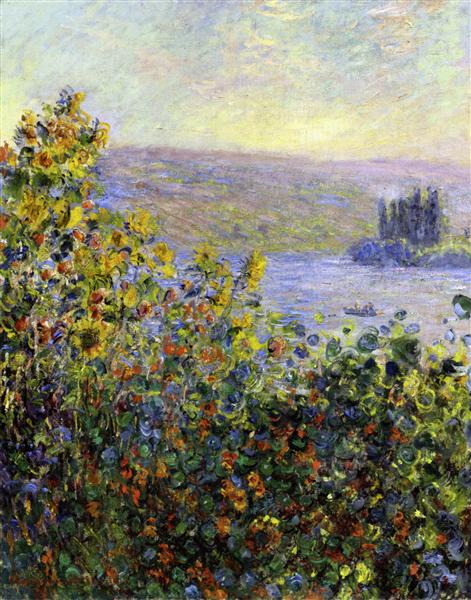Descriere
Claude Monet, a central figure of Impressionism, delivers in Flowerbeds at Vetheuil (1881) a work that encapsulates the essence of his technique and his predilection for nature. This painting, one of the many representations he made of his surroundings, highlights his ability to capture the transience of light and color. Vetheuil, a small town on the banks of the Seine where Monet lived, provides the ideal setting for his exploration of the landscape and the interplay between flora and changing light.
Visually, the painting is a burst of vibrant colours that bring the flowerbeds to life, where shades of pink, violet and yellow predominate. Monet constructs a harmonious dialogue between the different hues, making each flower shine in a space that seems to vibrate with energy. The loose brushstrokes and layers of colour combine to achieve an almost ethereal atmosphere, where the viewer can feel the freshness of the air and the fragrance of the flowers. The richness of the colour not only adds to the beauty, but also brings a palpable texture to the surface of the canvas, characteristic of the Impressionist style.
The composition is simple, but powerful. The lower plane is occupied mainly by the flower beds, which spread out in a dance of shapes and colours, while the background features a luminous sky, in which barely defined clouds are hinted at. This arrangement gives depth to the work and immerses the viewer in a landscape where the earthly and the celestial meet in a moment of calm. Monet avoids the inclusion of human figures in this work, an approach that highlights the connection between the viewer and the natural environment, emphasising the solitude and serenity that can be experienced when in contact with nature.
The open brushstroke technique Monet uses in this work is not only a hallmark of Impressionism, but also allows light and shadow to intertwine in a visual dance. This ability to capture changing light is one of Monet's most enduring legacies. In this painting, the effects of sunlight filtering through the flowers create shadows and reflections that add a sense of movement and life to the static scene.
"Flowerbeds at Vetheuil" is also a reminder of Monet's love for his surroundings and his eagerness to translate them into images that transcend the mere physical setting. This work is a celebration of the natural beauty that surrounded him, a theme that resonates in many of his other productions, such as the famous "Monet's Garden at Giverny." Through his repeated explorations of his local environment, Monet did not simply document a place, but also captured the passage of time and the transformation of light, a pursuit that can be traced throughout his entire career.
This painting, in its simplicity and depth, is a testament to Monet’s virtuosity as an artist and to the Impressionist movement in general. Although Flowerbeds at Vetheuil may appear to be a mere depiction of flowers in a garden, it ultimately invites us on a deeper journey, to contemplate ephemeral beauty and the intimate connection we have with the natural world. The work remains a beautiful reminder of Monet’s ability to view the world through a lens of light and color, capturing in an instant the essence of what it means to be alive.
KUADROS ©, a famous painting on your wall.
Hand-made oil painting reproductions, with the quality of professional artists and the distinctive seal of KUADROS ©.
Painting reproduction service with satisfaction guarantee. If you are not completely satisfied with the replica of your painting, we will refund 100% of your money.

